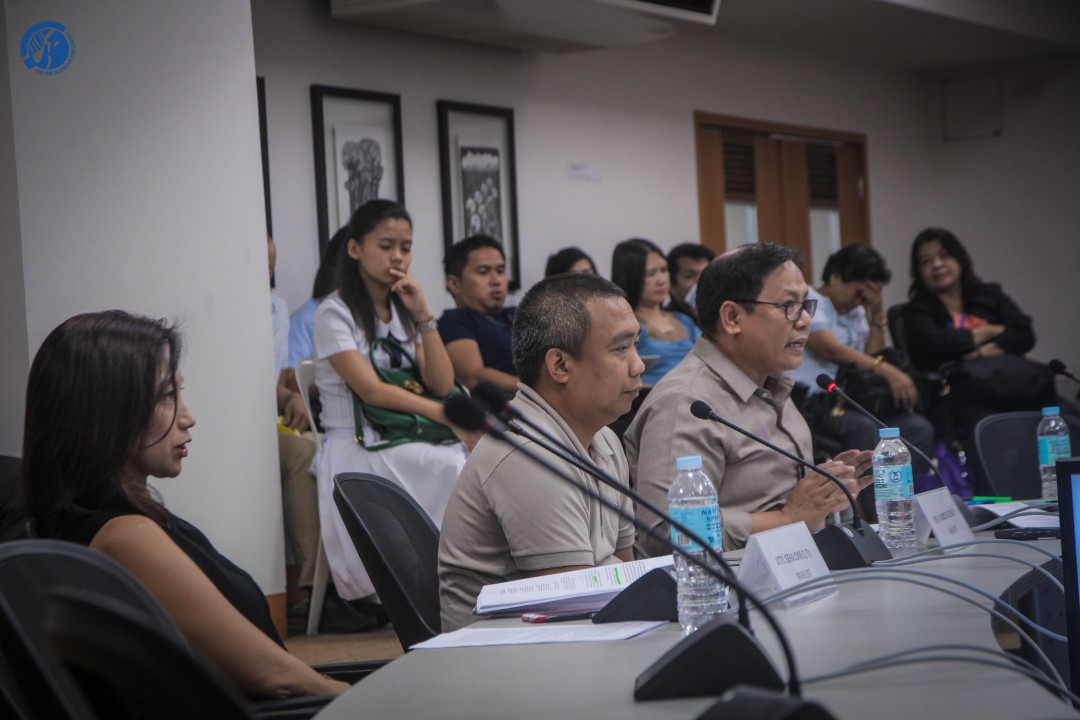
Experts and analysts discussing the SC ruling and its implications during the session. Photo by Camaela Mijares
In relation to the recent and controversial Supreme Court ruling on Ferdinand Marcos’ burial at the Libingan ng mga Bayani (LNMB), the Ateneo de Davao University’s University Community Engagement and Advocacy Council (AdDU UCEAC) spearheaded a Pakighinabi session last Nov. 14, at the Pakighinabi Room, Ricci Hall, Community Center to look closely at the implications of the said SC decision.
Students, faculty, and other representatives from different offices, departments, and partner NGOs attended the said event. Entitled “951 Ang Hukom, Si Marcos at Ang Sambayanan: A collective analysis of the Supreme Court ruling on the Marcos Burial”, the dialogue was done through a panel discussion that aimed to present and explain the issue from different perspectives—legal, political, and social among others.
To set the tone for the dialogue, a summary and brief presentation of the topic was first done.
Among those discussed by the panelists were the technicalities, and the legal and political aspects of the decision. It was explained that the petition decided upon pertained on the alleged grave abuse of discretion of the President by ordering Marcos’ burial in the LNMB. Further tackled were the laws involved as to the issue, the SC ruling itself, as well as other arguments and perceived consequences that could possibly arise from the ruling therefrom.
Moreover, disputes as to the “labelling” of Marcos being a hero or not a hero, and the burial place itself being called as the Libingan ng mga Bayani were also pointed out. The moral and the social justice aspect were also highlighted, identifying the horrors during the Martial Law Era and the corruption and said ill-gotten wealth of the Marcoses.
Third year Political Science student Roberto Zamora, Jr. shared what he thought of the event.
“It was a great opportunity to know the reasons why the Supreme Court arrived at such decision. First thoughts are just first. You have to understand more of what it is and what should be done before making any judgement,” he said.
AdDU UCEAC chair Atty. Romeo Cabarde Jr. concluded the dialogue with what has transpired from the discussions and exchanges.
“More than forgiveness, what we are searching for is the true meaning of justice more than the law. Nakita natin ang iba’t ibang pagtingin sa desisyon. The supreme court did exactly what it is supposed to do—read the law, interpret the law. Although some other sectors are saying that this could have been a golden opportunity for the SC to not only look at it from the point of view of law, but from the point of view of justice because there are so many symbolic representations involved that might in a way obliterate the sense of justice and history and memory of the younger generations,” he said.
“From here on, let’s continue the conversations, let’s continue the dialogue. These are all part of our formation, consciousness, […] as students and members of the Ateneo community. I think that we are called to understand what’s happening around us because it’s our own call to be leaders Sui Generis,” he added.